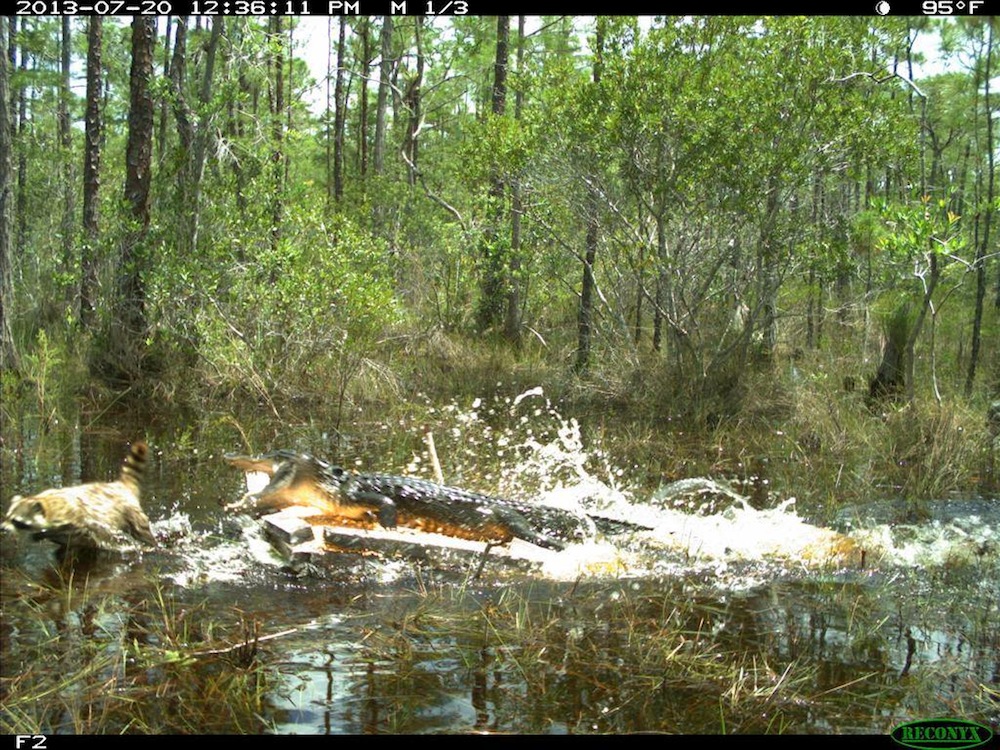Birds Use Alligators As Bodyguards

Birds may use alligators as bodyguards to protect their nests from hungry raccoons and opossums, but gator payment may come at a steep cost — namely, in the form of the birds' chicks that are dropped into the water, researchers say.
For many species of birds, the greatest threat their chicks face are nest-attacking predators, such as raccoons and opossums. Previous research found that wading birds — such as storks, herons, egrets, ibises and spoonbills — often choose to nest above alligators. By doing so, these birds benefit from the way in which the formidable reptiles often scare off, or even eat, smaller predators. Such mutually beneficial relationships between reptiles and birds may be common throughout the tropics, scientists noted in previous studies.
However, there was little research into what, if anything, alligators gained from such arrangements. One possible grisly benefit that prior studies suggested the reptiles might receive were meals in the form of chicks pushed from the nests. Many colonially nesting birds lay more eggs than they can raise, and the birds typically adjust the size of their broods to fit available food levels by ejecting one to two chicks from each nest, alive or dead. Such chicks might provide the gators with a substantial source of meat, the researchers said. [Beastly Feasts: Strange Photos of Animals Eating Other Animals]
To see if alligators might reap such gruesome rewards, the scientists compared 20 alligators that lived near nesting colonies of wading birds in the Florida Everglades with 19 alligators that did not live near such colonies. The researchers focused on female alligators because they move less and have smaller home ranges than males in the Everglades, and therefore should be a better reflection of food opportunities near their homes than males, the researchers said.
To see how well fed the alligators were, the scientists measured their mass and length, and took blood samples to measure blood nutrient levels. They found that the alligators that lived near wading-bird nesting colonies were better nourished than the alligators that did not live near wading-bird nesting colonies. This is the first time that scientists have shown that these birds and reptiles have a mutually beneficial relationship, said study lead author Lucas Nell, an ecologist at the University of Georgia in Athens.
"I was particularly surprised by the magnitude of the difference in body condition — that is, fatness or health — we found," Nell said. "To put this into perspective, a 2-meter-long (6.5 feet) alligator would, on average, weigh about 3 kilograms (6.6 pounds) more near a nesting colony than [one in a] similar habitat without a colony."
In previous research, scientists placed fake alligators near islands in the Everglades that wading birds might colonize. The research revealed that such birds colonized the islands with fake alligators significantly more often than the islands without fake alligators, Nell said. [Florida Everglades: Follow the 'River of Grass' (Photos)]
Get the world’s most fascinating discoveries delivered straight to your inbox.
Moreover, this prior work also found that although about half of the islands in the Everglades with no wading-bird nesting colonies had alligators present, 96 percent of the islands with such colonies had alligators. This finding suggests that these birds seek out these alligators and that these alligators seek out these birds — the alligators are not too difficult to find, as they often lie conspicuously on land when basking, and loud, smelly bird colonies are equally easy for gators to find, Nell said.
Nell emphasized that the alligators do not appear to intentionally protect the birds and that the birds do not appear to intentionally sacrifice chicks to the alligators. "Birds neglecting a certain number of chicks is based, to our current knowledge, entirely on food availability," Nell told Live Science. "From what we know, both partners here are acting selfishly with no concerted effort to cooperate with the other."
The researchers noted that crocodilians and nesting birds are often found together throughout the tropics. As such, the mutually beneficial relationship that the scientists discovered "could be a globally widespread and ecologically important interspecies set of relationships," Nell said.
Future research can investigate whether wading-bird nesting colonies help alligators persist in places they might otherwise not. "This has important implications in Everglades restoration, especially given that alligator body condition appears to be trending downwards overall," Nell said.
The scientists detailed their findings March 2 in the journal PLOS ONE.
Follow us @livescience, Facebook & Google+. Original article on Live Science.



